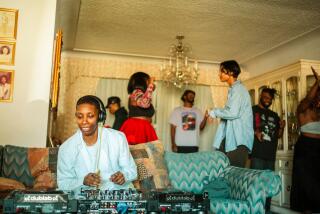Voice of Apartheid Era May Vanish From S. African Airwaves
PRETORIA, South Africa — The days of apartheid are over, but listeners of Radio Pretoria can still wake up and sip their coffee to the strains of the apartheid-era national anthem, “Die Stem.”
They tune in to talk shows where pundits frown on the mixed marriages and interracial socializing that have accompanied the demise of apartheid. They hear debate over whether the AIDS crisis is helping curb the black birth rate, or enjoy cultural programs featuring German marching music and rousing Swiss yodeling.
Since its unveiling a decade ago, Radio Pretoria, broadcast in the Afrikaans language, has become a beacon for conservative Afrikaners who held sway in South Africa until white rule ended in 1994.
But now it could be taken away from its 100,000 listeners.
In the next few days, a South African judge is to rule whether Radio Pretoria can continue operating. The station’s refusal to hire blacks or anyone but white Afrikaners has put it at odds with the country’s new constitution, which prohibits the kind of discriminatory hiring practices that were once the rule here.
“They’re trying to close us down,” lamented Jaap Diedericks, the gray-haired, bespectacled station manager. “We only employ good Afrikaners, the people who are our target audience. If it is known we employ coloreds or Zulus, Xhosas and those people, our own people will stop supporting us.”
Especially, Diedericks said, at a time when government affirmative action places blacks in line for jobs that, in the old days, would have gone to Afrikaners.
“We can’t now stick them in the back by employing other people while they’re being laid off by the thousands,” he said. “There is no way we are going to be forced to employ other cultures at a cultural radio station. That is as clear as mud.”
The station’s legal woes began in 2001 when its hiring practices prompted the Independent Communications Authority to refuse to renew its license, giving the station 30 days to close, Diedericks said.
The station took the case to the courts, and got permission to continue broadcasting until the matter was resolved this year.
Two weeks ago, a black judge, Ronnie Bosielo, listened impassively in a Pretoria courtroom as the station’s attorneys argued that its unique nature demanded racially exclusive hiring.
Take South Africa Airways, a Radio Pretoria attorney suggested. Wouldn’t hiring an HIV-positive flight attendant present passengers with the specter of infection? Would it be practical to force Radio Islam to hire Jewish employees?
“How would it sound to a Jewish worker at Radio Islam, those points of view?” he said. “Would it not be killing off dignity by employing people who do not fit?”
Stanley Mamaregane, senior manager of licensing of the state communications board, said: “Our constitution dictates that you cannot discriminate on the basis of race. You might be able to make a case that an announcer should be a Boer Afrikaner, but do your technicians also need to be? This kind of blanket policy seems discriminatory. The constitution is the law of the land. You can’t just ignore it.”
Station employees say they were chagrined last year when right-wing Afrikaner militants began showing up for the hearings with pamphlets supporting Radio Pretoria, “giving us a bad name,” according to one employee. Now the station keeps the court dates a secret.
“If we lose this court case we will be ordered to close down in 30 to 60 days. But we will appeal,” Diedericks said.
The station’s offices, in suburban Pretoria, are a shrine to apartheid nostalgia.
Wall-sized oil paintings of apartheid leaders dominate the foyer, transforming it into a who’s-who gallery of South Africa’s historic white rulers, such as former Prime Minister Hendrik F. Verwoerd, the leading architect of apartheid.
Programming reflects a similarly sentimental approach. A special show, “Great Power,” caters to elderly Afrikaner listeners who feel dislocated in a post-apartheid world that they associate mainly with South Africa’s skyrocketing crime rate and their marginalization as their language and culture are pushed out of the mainstream.
“Pining for law and order and less crime is not pining for apartheid. Many blacks also have nostalgia for the so-called apartheid days,” Diedericks said. “They pine for the better schools of apartheid days.”
Radio Pretoria also has served as an outlet for the views of more militant residents, who call in to voice their support for members of right-wing groups who have been accused of conspiring to use violence to overthrow the government.
The station is the principal proponent of the so-called Afrikaner homeland movement, and a fervent on-air recruiter for -- and fierce defender of -- three small Afrikaner communities whose residents would like some form of self-government.
To Diedericks, Radio Pretoria is one front in a greater battle: to defend Afrikaner culture.
“There will be a bloodbath, a big war in Africa, if they try to grab the Afrikaners’ land from them,” Diedericks said. “We didn’t build up a civilization just to let it slip away into chaos. If we have to fight a holy war like the Islamic, a jihad, then we Christians can do the same thing.
“If you really believe in your religion, your own culture, you’re willing to die for it.”
More to Read
Sign up for Essential California
The most important California stories and recommendations in your inbox every morning.
You may occasionally receive promotional content from the Los Angeles Times.









